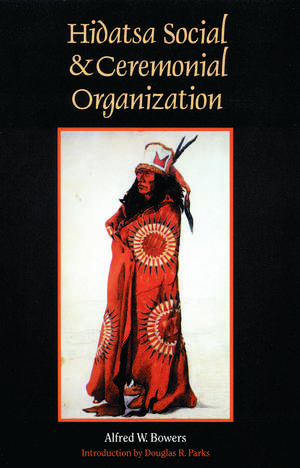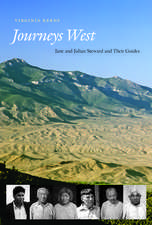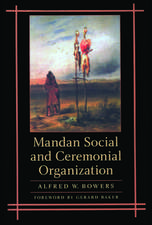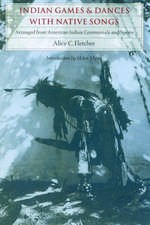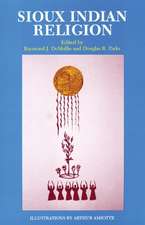Hidatsa Social and Ceremonial Organization
Autor Alfred W. Bowers Introducere de Douglas R. Parksen Limba Engleză Paperback – 30 sep 1992
Hidatsa Social and Ceremonial Organization, a study of an important horticultural Plains Indian tribe, synthesizes the rich material Alfred W. Bowers recorded in the early 1930s from the last generation of Hidatsas who lived in the historic village of Like-a-Fishhook. This documentary record of their nineteenth-century lifeways is now a classic in American ethnography. The book is distinguished for its presentation of extensive personal and ritual narratives that allow Hidatsa elders to articulate directly their conceptions of traditional culture. It combines archeological and ethnographic approaches to reconstruct a Hidatsa culture history that is shaped by a concern for cultural detail stemming from the American ethnographic tradition of Franz Boas. At the same time, its concern for the understanding of social structure reflects the influence of the British structural-functional approach of A. R. Radcliffe-Brown. The most comprehensive account ever published on the Hidatsas, it is of enduring value and interest.
Preț: 154.46 lei
Nou
Puncte Express: 232
Preț estimativ în valută:
29.56€ • 30.94$ • 24.60£
29.56€ • 30.94$ • 24.60£
Carte disponibilă
Livrare economică 10-24 martie
Preluare comenzi: 021 569.72.76
Specificații
ISBN-13: 9780803260986
ISBN-10: 0803260989
Pagini: 528
Ilustrații: Illus.
Dimensiuni: 152 x 229 x 38 mm
Greutate: 0.79 kg
Editura: BISON BOOKS
Colecția Bison Books
Locul publicării:United States
ISBN-10: 0803260989
Pagini: 528
Ilustrații: Illus.
Dimensiuni: 152 x 229 x 38 mm
Greutate: 0.79 kg
Editura: BISON BOOKS
Colecția Bison Books
Locul publicării:United States
Notă biografică
In his introduction Douglas R. Parks, associate director of the American Indian Studies Research Institute at Indiana University, discusses the place of Bowers's work in the history of the Plains Indians. He is the author of Traditional Narratives of the Arikara Indians (1991), also published by the University of Nebraska Press.
